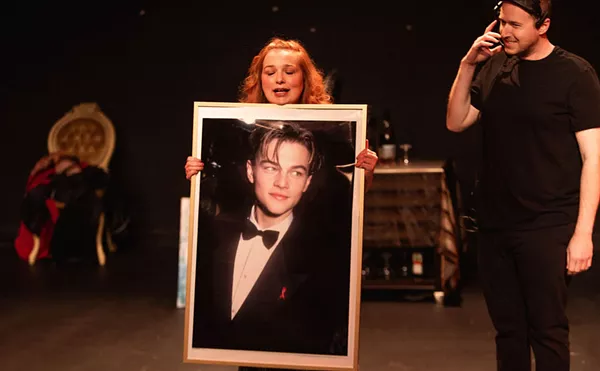It all started with She Loves Me.
Soon after I returned to St. Louis in 2001, after having spent 22 years in New York and Los Angeles, I was approached about writing theater reviews for the Riverfront Times. My distant memories of St. Louis theater were mostly restricted to summer musicals at the Muny and touring shows at the American. I would soon learn that by 2001 the local offerings were much more varied than that. Although finding an effective theater space was (and remains) a challenge, the work was often inventive and invigorating. My first RFT review in August 2001 spread the good news about a charming production of the jewel-box musical She Loves Me at Stages St. Louis. The bright cast included Kari Ely, Steve Isom, Ben Nordstrom and Whit Reichert, actors who were unknown to me at the time but whose work set a high bar for local performances.
For the first nine months my fledgling reviews shared the stage page with those written by the estimable Brian Hohlfeld, an alum of St. Louis' fabled Theatre Project Company. In May 2002 Brian informed me that he was going to cease reviewing. "I've filed fifty reviews," he said. "I think I'm written out."
More than a decade later, I have now filed more than 550 full reviews, nearly 200 capsule reviews and more than 150 feature stories, interviews and essays. I've written more than a half million words about theater (and occasionally film) in the RFT. Although I'm not yet "written out," at the end of next month I will be relinquishing this prized position.
The best part of reviewing has been the joy of getting to see something wonderful first. I still thrill to the thunderous audience response a decade ago at HotHouse Theatre Company's opening night of the American premiere of In a Little World of Our Own, a sinewy drama set in Northern Ireland. It was a privilege to describe the electrifying performances by Joel Lewis and Peter Mayer. In 2006, Echo Theatre Company's staging of The Sugar Syndrome was acted with such piercing sensitivity by Terry Meddows and Magan Wiles that the review practically wrote itself. The same could be said of the 2009 U.S. premiere of the harrowing Helver's Night at Upstream Theater, which featured stunning work by Linda Kennedy and Christopher Harris.
Over the years I've come to believe in the importance of theater reviews. Regardless of whether the opinion is positive or negative, a printed review completes and validates the process. In a milieu in which the actual theater experience too soon becomes memory, a review affirms that this play happened. Oftentimes more people will read the review than will see the production, so a review should recall that event with some specificity.
I once spent an afternoon with the composer Virgil Thomson, who also was one of America's most distinguished music critics. I asked Thomson how he was able to work with other musicians after he had reviewed them unfavorably. "That was never a problem," he replied, "because I always sought out the precise adjective. The precise adjective is everything. If you use too many nouns, you'll wind up calling people names. But if you use a precise adjective to describe how they did what, any other competent observer there will have to say you were right." I don't know how often I've been right, but I do know that the most oft-used words in my reviews have been "perhaps" and "because."
At the same time, a reviewer should not require a confirmation of his views. I concur with the gentle poet and author Mark Van Doren, who wrote, "A dedicated critic does not presume to prove; he merely says things — and risks appearing a fool if nobody believes him. If he is believed, that is another matter; but still he has proved nothing." In all these years, I've never tried to force an opinion down a reader's throat. There's nothing more wasteful than trying to persuade someone they shouldn't like something they do like.
I have written my share of dissenting reviews, though perhaps not so many as some might think. An inventory of 560 reviews written between 2001 and last week breaks down as follows: 299 (53 percent) positive, 126 (22 percent) mixed, 139 (25 percent) negative. This distribution sounds equitable to me; nothing constructive is served by an excess of blind zeal. I was once privileged to visit Harold Clurman, arguably the most perceptive American theater critic of the 20th century. Clurman believed that if we want more good theater, of necessity, there must be more bad theater first. I've seen my share of bad theater. But I've also reviewed great theater.
There was a time when I used to go to New York every year to catch up on the latest shows. During my twelve years with the RFT, I've only seen one play in New York — and I've not missed going. In its stead, I have seen standout local productions of A Flea in Her Ear, The Last Five Years, Stones in His Pockets, Urinetown, The Lieutenant of Inishmore, Sunday in the Park with George and The Foreigner, all at the Rep; King Hedley II, Ruined and Ma Rainey's Black Bottom at the Black Rep; a gorgeous A Little Night Music at Stages St. Louis; a commanding Sweeney Todd at Opera Theatre; Awake and Sing! at New Jewish (why does Clifford Odets' script read so dull and play so well?); and a hilarious Noises Off at Act Inc. Every May brought the magic of Circus Flora. The Muny is now in capable hands, once again staging musicals of the high caliber I grew up with. (Thanks, Mike and Denny.) It's also been fun to see shows that could fill the Fox stage: the first national company of The Producers led by the dervish Lewis J. Stadlen, the humbling Deaf West mounting of Big River, and August: Osage County, which featured protean work by Estelle Parsons.
But there have been indelible performances here, too, including Colleen Backer's gossamer Cecily in The Importance of Being Earnest, Gary Wayne Barker's baleful chauffeur in The Homecoming, Kevin Beyer's Salieri in Amadeus and his Coach in That Championship Season, Lavonne Byers' patrician mother in A Delicate Balance. I was wrenched by the anguish of John Flack's Quentin in After the Fall and haunted when Joe Hanrahan spun a boozy Irish ghost story in St. Nicholas. I was delighted when the deft Alan Knoll, Michelle Hand and John Krewson found the frolic in David Mamet's November; I was dazzled when Nancy Lewis and Meghan Maguire so sublimely duked it out in David Margulies' Collected Stories.
Student productions have been equally important to my theater growth: Washington University unlocked the mysteries of Caryl Churchill's cryptic Cloud Nine, Saint Louis University transformed Lorca's House of Bernarda Alba into a sensual spellbinder and the Conservatory at Webster University introduced me to the luminous chamber musical Violet and to the Lillian Hellman barnburner The Children's Hour.
People will ask: You have a great job, so why are you leaving? And it's true that my editors at the RFT have been the best possible partners. There are always a variety of reasons behind a decision to surrender something you've loved and built, but here is one. In 1993 when New York Times theater reviewer Frank Rich voluntarily left his lofty perch after thirteen years, he was asked the same question: Why are you going? His reply: "How many ways can you describe Bernadette Peters?" I know how he felt.
It is time for a fresh voice.
Editor's note: Dennis Brown's reviews will officially conclude at the end of the calendar year.






